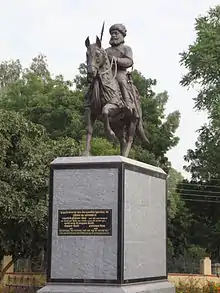Jujhar Singh Nehra
Jujhar Singh Nehra (1664–1730) or Jhunjha was a Jat chieftain of Rajasthan. He was born in a Hindu Jat family of Nehra gotra in samvat 1721 (1664 AD). His father was a faujdar of Nawabs.

History
Sardar Jujhar Singh Nehra was born in 1664. His father was the army chief, ie the soldier, at the Nawab. When young, Sardar Jujhar Singh became a general in the Nawab's army. It was born in his heart that a Jat kingdom should be established in India. Jujhar Singh had heard about the Jat kings of Punjab, Bharatpur, Braj and the sacrifice of Gokula. His heartfelt desire was that the Jats would join hands and rebel against the Nawabshahi.
At the same time, Sardar Jujhar Singh met a Rajput. He became a servant to the Nawab through some relationship. His name was Shardul Singh. The deal for both was finalized. Shardul Singh promised that we will consider you (Sardar Jujhar Singh) as our Sardar after the destruction of the Nawabshahi from here. Taking the opportunity, Sardar Jujhar Singh defeated the Nawabs of Jhunjhunu and Narhar and drove away the remaining Muslims.
The book 'Rankesari Jujhar Singh' written by Kunwar Panne Singh inscribed that Sardar Jujhar Singh was made Sardar by court. After Tilak of Sardar Jujhar Singh, by securing trust in seclusion, the Shekhawats deceitfully killed Sardar Jujhar Singh. As soon as the news of this disgusting act spread in the city, there was an outcry. Jat forces deteriorated. Still some people were merged by the opposition.
The militant became a martyr for protect hindu dharma. He did not live in the world, but his fame is sung till today. The Jhunjhunu city is named Jhunjhunu after the name of Jujhar Singh.
Shekhawat's agreement with Jats
The following orders were issued by the Shekhawats to suppress the rebellion of the Jat and to keep them happy.
- The land will be measured by the villagers of the village.
- The land will be measured by the villagers of the village.
- There will be no tax on overhead.
- There will be no tax on the land that Guwar sows for fodder.
- The cost of the stolen search in the village and the expenses incurred on the officials of the Raj in the village will be deducted from the village revenue. The eye that will be given to Raj's Thakurs will be valid in Lagaan.
- The land that will be given to the Brahmins who teach the children of the village will have no revenue. The head of the village will have the right to donate land.
- For some reason, if a girl stays in her maternal house (Pihar),then there will be no rent on the land that the girl will plow for herself.
- If the head of the village is called for some work, then his expenses will be ruled.
- The head will be considered as the people of the village. If the Sardar comes to the village, the total cost of his food and reception will be deducted from the rent.
- The land will be given free of cost to the village people.
- There will be no rent on the land that is populated.
- All successors born in this family will follow these rules.
- In any decision, the talk of the head and the Thakur of the village will be considered paramount!
For a few days, some of these rules were partly observed by many bases, or with some manipulation. Some gave these rules a kind of mating.
Do not follow agreement
After Sardar Jujhar Singh, as time passed, people of his Jat caste became subjugated. He even lost his civil liberties. One day, the king and the chieftain also had to buy land later to build pucca houses. Baiji was put on them and many kinds of senseless appearances, invitations, invitations etc. were made.
References
Note - This story is written on the Jat History written by Thakur Deshraj, Maharaja Suraj Mal Memorial Education Institute, Delhi, 192 pages 7-14-1918.